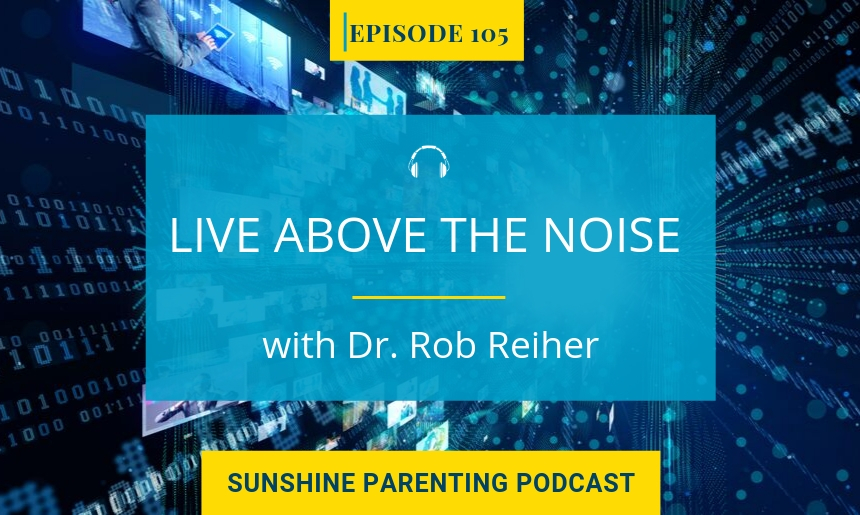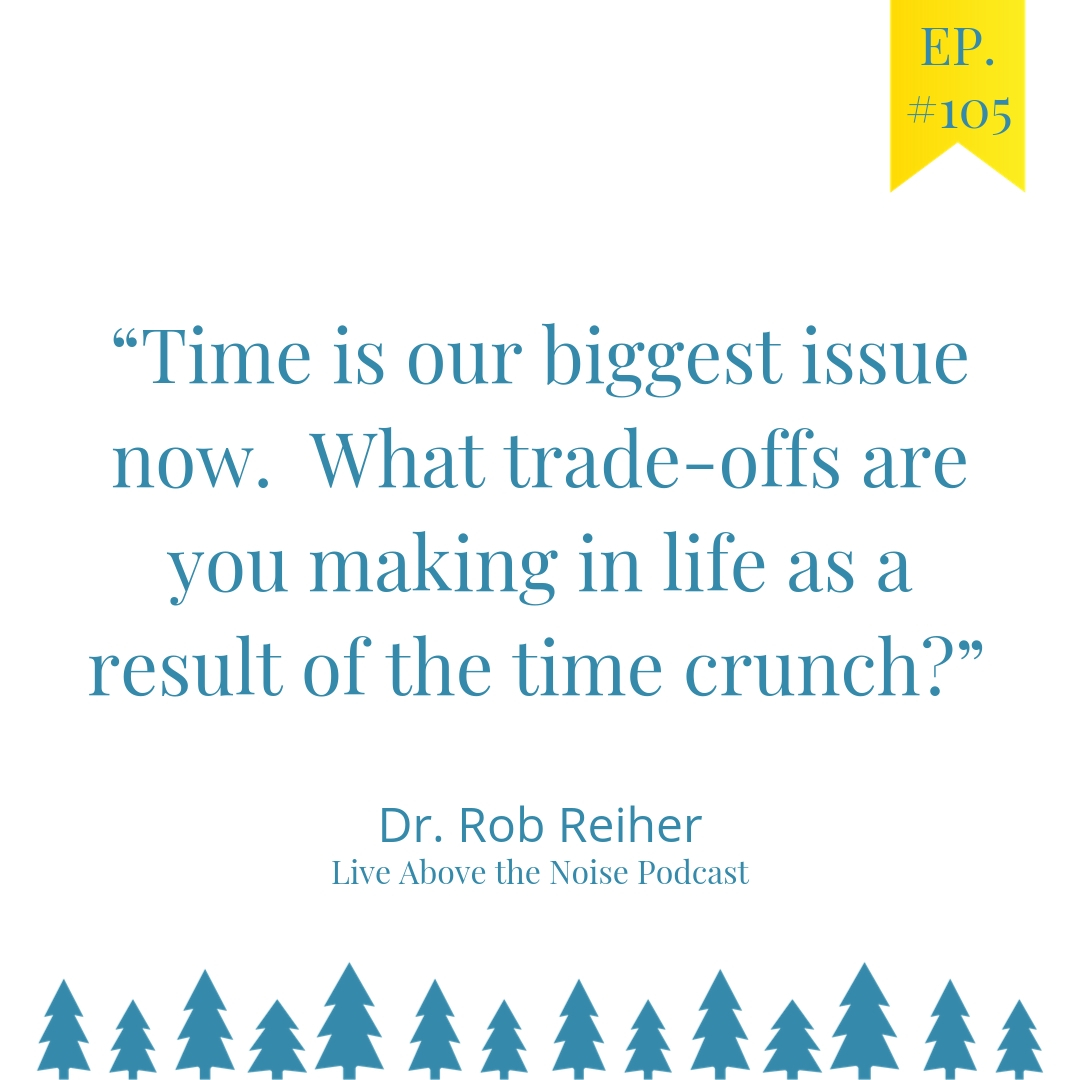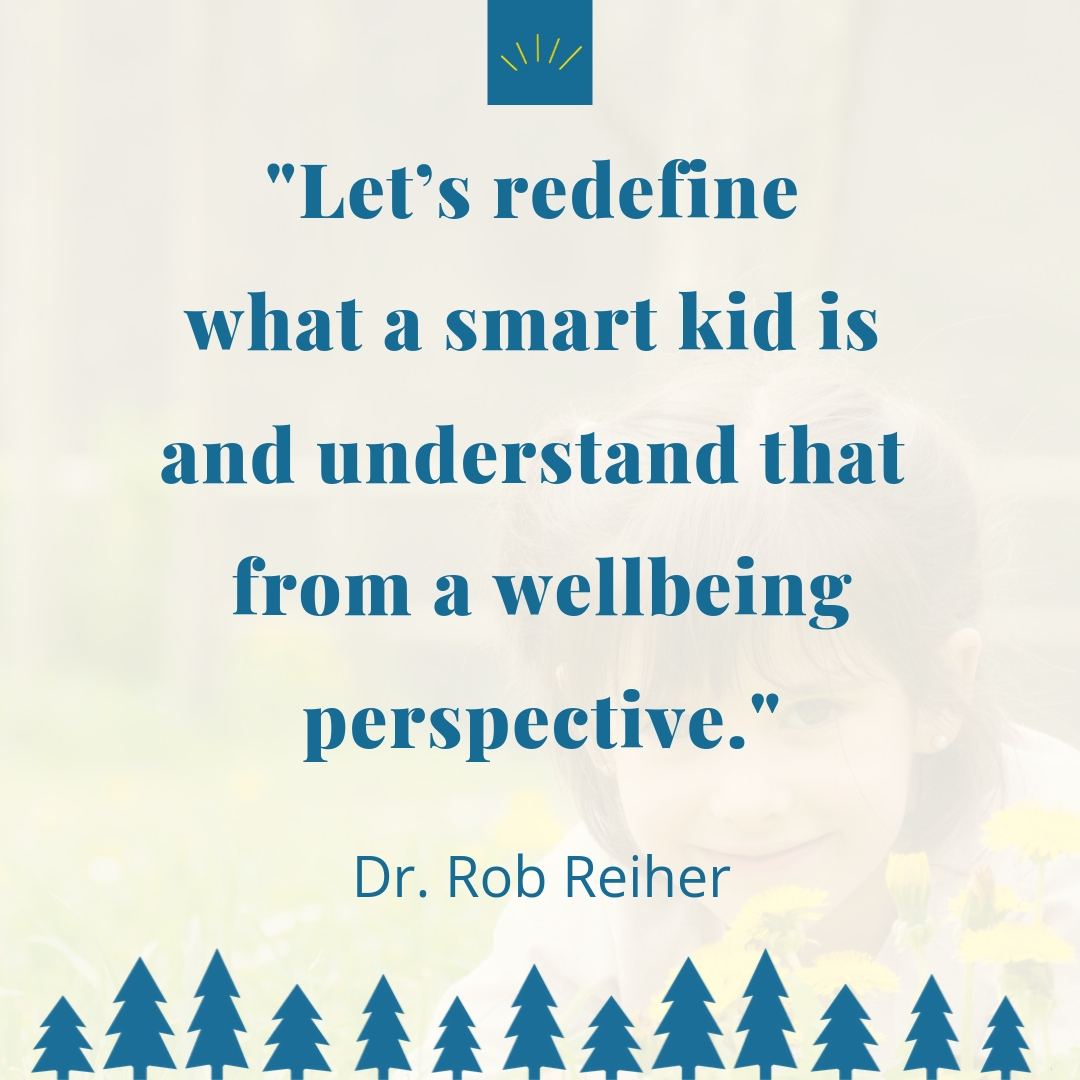
In this episode, I’m chatting with Dr. Rob Reiher, co-host of the Live Above the Noise podcast. Dr. Reiher is a developmental and educational psychologist, media expert and author. We discuss the escalating impact of technology, media, and consumerism and the overload on children, families, and society.
Dr. Reiher focuses on educating parents on the importance of teaching children to live above the noise and distraction of our world.
BIG IDEAS
- Dr. Reiher’s career began in product development but it soon became clear to him that the corporate world was more interested in profits than psychology.
- When your work is not congruent with your beliefs, it can cause harm emotionally and physically. We need to live our values.
- Humans are hard-wired to be distracted and are wired with blind spots.
- The Inner IQ stands for Inner Integral Qualities – a critical set of inner qualities (such as self-management) that protect and prepare our children for the future.
- There are 3 IQ categories and each category breaks down into 3 sub-categories:
- your child’s character
- identity, values, and virtues
- your child’s competence
- self-management, meaning, and mastery
- your child’s communication system
- “me-com”, “we-com”, and “it-com”
- your child’s character
- All nine of those dimensions are critical for an individual’s wellbeing and provide a framework to be able to see what’s missing or breaking down.
- Integral Qualities are not the same as Intellectual Quotient, which is what is measured in schools.
- Because schools are they are not equipped to address the negative impact of toxic tech media and consumerism, they often contribute to the problem.
- It is ultimately up to parents to prepare their kids with these important internal qualities (IQ).
- It is important we learn to filter, manage and design our time, which can be broken down into 5 different types:
- TCB – Taking Care of Business time
- Toxic Time – when you feel emotional or upset
- Coping Time – dealing with stress by distraction
- Enrichment Time
- Inside Time – self-talk, inner time
- Take the time to self-reflect, or use the 5 Step PAUSE:
- P – Prepare
- A – Attune
- U – Uncover
- S – Shift
- E – Elevate
- The way you spend your time directly affects your wellbeing. For children to thrive and have fulfilling lives, we need to help them to live above the noise.
QUOTES
Audrey: “I think it’s a really important concept to teach kids to be more aware of what they’re feeling, how things are impacting them and an ability to see when, for example, something is addicting versus just entertaining.”
Rob: “We have an infinite appetite for distraction…and its a good thing in some ways. But when it gets manipulated by companies, then you have to make a decision. The combination of an infinite appetite for distraction and over 180 blind spots, creates the background for major trade-offs.”
Audrey: “It seems like the whole goal is to help parents to understand how they can protect their children and prepare them to live in this world that is an endless stream of distractions.”
Rob: “If we look at wellbeing as the goal, not happiness, and then if we go underneath wellbeing and we say, what do we know in positive psychology about how wellbeing works, we can create a framework for parents that would give them a way to keep track of the dimensions of wellbeing that may be in jeopardy.”
Rob: “It’s like it is the hardest thing in the world, in this overwhelming society, to say, what do I pay attention to? What is important? There are so many people saying so many things.”
Rob: “Let’s redefine what a smart kid is and understand that from a wellbeing perspective, as opposed to what schools still keep in place as an IQ. Unfortunately, the traditional IQ intelligence quotient that our schools promote does not adequately address the growing negative impact of toxic tech media and consumerism on our children’s development. School alone is simply not enough to prepare them for a fulfilling future.”
Rob: “I’m in love with your camp concept because that’s one of the places (where kids can develop the good kind of IQ) being away from home, getting that break from technology.”
Rob: “Time is our biggest issue now and everybody’s really struggling with their time. Ask yourself, what trade-offs are you making in life as a result of the time crunch?”
Rob: “One interesting thing about that time crunch is that 11 million bits of information per second is coming at us. We’re only capable of processing 5.7 of the 11 million bits of information per second. So what does that mean? Well, the implication is you better have a filter.”
Rob: “You’d better understand how you’re using your time and start to filter and restructure the information coming in (we know the brain is biological and that we have neuroplasticity) because we’re wiring what’s coming into the brain.”
Audrey: “This obviously needs to start with parents modeling this for their kids because we’re not going to raise kids who have good time design if we haven’t figured it out.”
Rob: “I think what we forget about often is that there are always these three interacting dimensions in life and don’t ever forget that the cultural dimension who is creating what they want to get your attention to take your time away to make you trade off your life is creating those kinds of things out there that are purely designed for addiction.”
Rob: “I look at what has happened over the last 20 years, with this speed of change in the mix and with the tradeoffs that we’ve made, the inner communication has been the one that’s been affected the most…That whole inner world which is the conduit to the higher brain functioning, to you abilities to understand yourself and revise you you are, is the one that’s paying the biggest price for the change in culture.”
Audrey: “It’s so unusual today for kids to ever have five minutes where they’re inside themselves just thinking, reflecting, and I think it’s true with adults too. I think many adults go days, weeks, months without any inner reflection time.”
Audrey: “My way of getting inside is to write down my thoughts. It gets me to slow down and stop doing that immediate-answer kind of thing. I do think that providing our kids and our families those kinds of opportunities, even if it’s just five minutes sitting on the couch quietly together, stops all the craziness.”
Rob: “The funnel of Choice-Fulness is first ‘awareness’, second ‘ability’ and then ‘control’. If you don’t work on the first part of the funnel, which is increasing your awareness, you’re going to pay a price for your abilities because you need awareness. You translate those into how you control the world around you and you fine-tune your skills, what you’ve learned by uncovering those abilities, into your future.”
RESOURCES
Listen to my interview on the Live Above the Noise podcast.
EPISODE 15: PARENTING EXPERT, AUDREY MONKE – SOCIAL SKILLS AND GRIT
Books by Robert Reiher
Related Posts/Podcasts
If you enjoyed this podcast, listen to Episode 45: Social Media Wellness with Ana Hoayoun.


